Ten lessons from Ogun State - from first COVID-19 case in Nigeria to building a resilient response
Vivianne Ihekweazu (Lead writer): On the day marking one year since the first COVID-19 case was reported in Nigeria, this article reflects on the experience and lessons learnt from the Honourable Commissioner for Health, Dr. Tomi Coker as she led the response in Ogun State.
- 11 March 2021
- 10 min read
- by Vivianne Ihekweazu
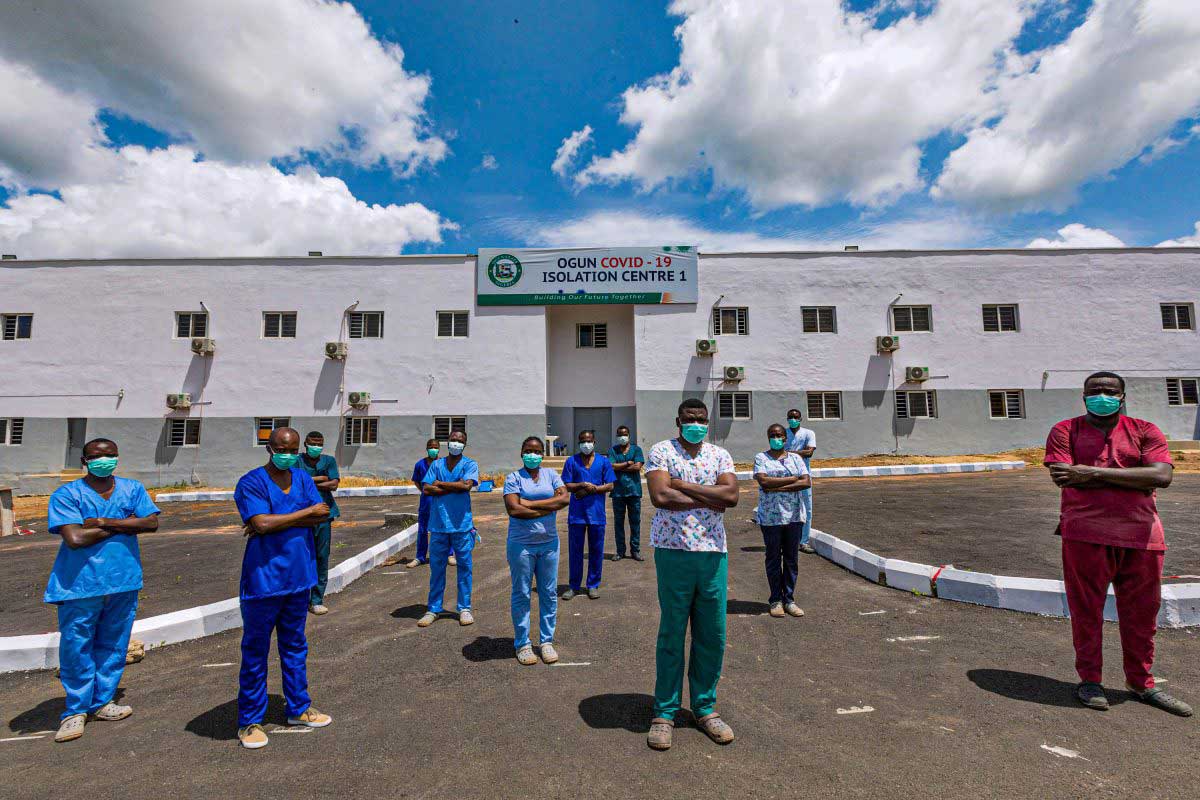
What a difference a year makes. Three hundred and sixty days that changed our lives forever. The 27th of February 2020 will forever be etched in the memories of residents of Ogun State. The Chinese government had alerted the World Health Organisation (WHO) to a cluster of patients with pneumonia in early January 2020. At this stage, most countries around the world had no idea what lay ahead. Cases were soon reported in other South East Asian countries, Europe and United States. The Nigeria Centre for Disease Control (NCDC) announced the establishment of a multi-sectoral COVID-19 Preparedness Group. The signs were ominous as there were fears how African countries would cope, not if, but when the virus reached our shores.
Dr Tomi Coker had just been appointed as the Commissioner for Health, Ogun State two months prior. Recalling the day the index case in Nigeria was reported, ”we woke up on the 28th of February to hear that the first case of Corona virus infection had been identified from an Italian who was visiting a factory in Ewekoro, a town in my state, Ogun”. Her careful plans for the first year of her tenure had just been thrown up in the air, as she become the incident manager of the emerging pandemic in her state.
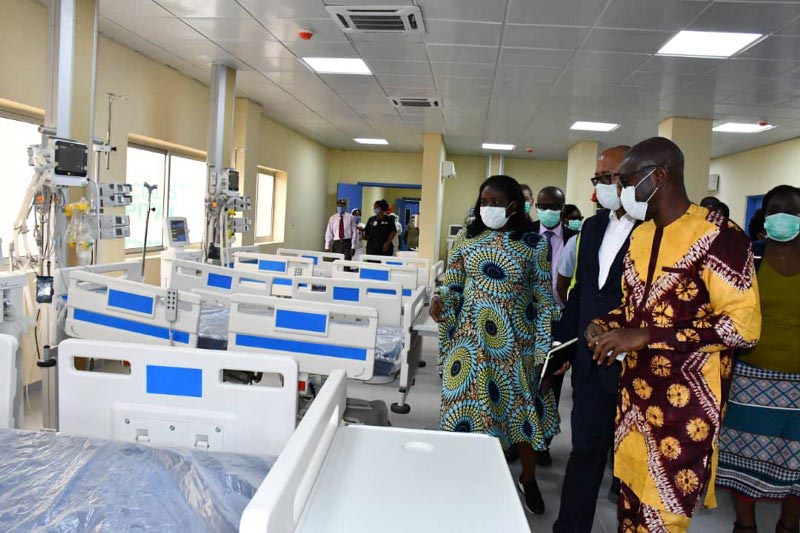
Photo Source: Ogun State Ministry of Health
Dr Amarachukwu Allison, a young doctor working at the clinic where the factory was located was astute enough to suspect COVID-19 when the index patient presented with flu-like symptoms and mentioned that he had recently arrived from Italy, where cases were on the increase. The patient was very cooperative and was subsequently transferred to the Infectious Disease Hospital (IDH) in Yaba, Lagos. In an interview with CNN, Dr Allison mentioned that although she might have been worried about her safety, some recent training she had received taught her “to try to put everybody first, you do not want to panic as you can put everyone else at risk”
Looking back at how Ogun State responded to the COVID-19 pandemic, Dr Coker reflected that she had “grown in leaps and bounds” in “public health crisis management” and also had the “privilege of working with one of the most learned people from the field which impacted upon my knowledge and skills”.
As the outbreak progressed, Ogun State has now reported 4,377 cases and unfortunately had 46 deaths. Although the incidence of new cases has reduced, the outbreak continues.
Here are 10 ways that Ogun State rose to the challenge, activated a robust multi-sectoral response in the face of a global health crisis and some key takeaway lessons, as the state continues to maintain their pandemic response.
1. Initiating a public health crisis response
The response to the index case was very swift as the team managing the patient had recently participated in training that guided their response and meant they quickly suspected COVID-19. Preparedness was a significant factor in the response and the availability of the IDH, the regional referral centre for all infectious diseases meant the patient could be quickly isolated. The rapid response from the World Health Organisation and the country’s national public health institute, the Nigeria Centre for Disease Control (NCDC) within six hours of the announcement of the first confirmed case brought immediate support. NCDC was able to quickly deploy a rapid response team as they had funds from an outbreak revolving fund, a funding mechanism provided by the organisation Resolve to Save Lives. This highlights the importance of having emergency funding for epidemic preparedness and response.
2. Multitasking and resilience during the response
The location of Ogun State presented an additional challenge as the state shares an international border with Benin Republic and four other states: Lagos, Oyo, Osun and Ondo. At the onset of the pandemic, many Nigerians returning to the country through the Ondo State border had to be screened before continuing to their destinations. Close collaboration was needed with the Nigeria Immigration Services and Port Health Services. Dr Coker was faced with having to simultaneously manage health, migration and social issues, all at the same time as managing the increasing stigmatisation of patients who were testing positive for COVID-19. Her resilience at this early stage of uncertainty was critical for her ability to hold her own.
Have you read?
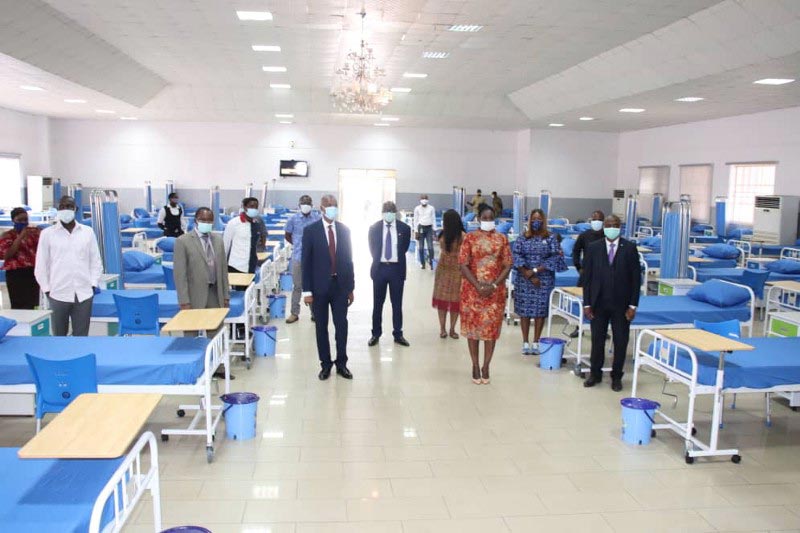
Photo Source: Ogun State Ministry of Health
3. Long term improvements in epidemic preparedness and response
Every crisis is an opportunity. Dr Coker realised from the first day of the response that strengthening Ogun State’s epidemic response architecture was just as important as responding to the outbreak. Immediately the outbreak started, an existing 18-bed isolation centre was renovated to accommodate the first patients. It had been used for a recent Lassa fever outbreak in the state. Part of the renovation was to ensure that that going forward, Lassa Fever and COVID-19 patients could be managed in the isolation centre simultaneously. Dr Coker was also very intentional in making health care investments that would not be temporary. Rather than use tents, existing facilities were turned around so that equipment bought was not just used for COVID-19 patients, but other patients that needed hospital care as well.
4. Federal government support – more consultation needed
The COVID-19 response was a collaborative effort and the federal government provided Ogun State with technical support and training at the onset of the pandemic. “The coordination came from the centre, because it was central, this can be a plus or a minus. The plus being that they provided equipment and it is guaranteed to be standardised”. However, Dr Coker reflected that each state’s needs differ, so looking back she mentioned “we didn’t have the opportunity to actually select the support we needed, we were told what support we got”. Giving the states the opportunity to provide input into the support they needed would have made the support more effective.”
5. Strengthening health systems in Ogun State
Thinking about some of the key take-outs from the COVID-19 response, Dr Coker mentioned that it had created an opportunity “to develop and grow our health system and actually invest in our health system”. Budget allocation and funding for health has always been a challenge and in Ogun State. Dr Coker stated that the state budget for health increased- “our budget went from 6% allocated to health, to 20.2%, and that was last year”. Thankfully, the allocation for 2021 has not gone down to pre-COVID-19 levels. There appears to be heightened awareness that investing in the state’s healthcare is critical. “It’s now in the consciousness of the policymakers that we need to invest in our health”.
6. Shared learning from other states
The experience in Ogun State as the location of the index case meant that the state learnt lessons quickly, ahead of other states, ”I found commissioners for health in other states calling me, asking how did you do that, how did you do this?”. Having an effective and well-prepared team also provided Dr Coker with support during the response, “I had a good team in my public health department, so they were able to support me”. The evolution of the virus occurred at such a fast pace and lessons were learnt and the response adapted throughout the year on a continuous basis. However, more coordination across the states would have enabled greater shared learning.
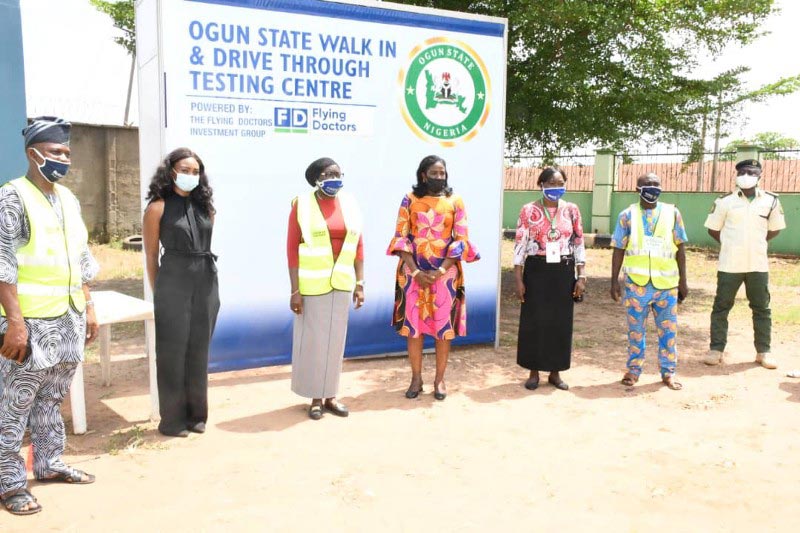
Photo Source: Ogun State Ministry of Health
7. Role of the private sector – no one can do it alone
Despite the best efforts of government, the public sector could not be expected to manage the response on their own. In Ogun state, collaboration with the private sector was critical for the response. The Coalition Against COVID-19 (CACOVID), a group of private sector organisations helped set up isolation centres. Other support came from telecommunications companies and banks located in the state. Dr Coker mentioned that “there were companies that came along and did logistics, while others donated PPEs, and a few pharmaceuticals donated large volumes of sanitizers”. There were many acts of kindness and care that saw Nigerians help each other through the difficult period of the lock down.
8. Lessons in leadership
Dr Coker comes from a background that provided her with some preparation for the public health crisis that came with the COVID-19 pandemic. As an obstetrician with over 28 years of experience, she noted that it “helped a little with the crisis management”. From her experience in obstetrics, it helped her “strategic outlook and resilience” and lessons learnt in building an effective team required identifying gaps and “recruiting the right skills needed to deliver”. Another key takeaway for Dr Coker in leading the response was the importance of networking and knowing the right people to call- “There is hardly any issue that I need to resolve for which I don’t know someone who can provide direction on speed dial on my phone”. Dr Coker was able to quickly transition from being a practising clinician delivering care to a public health leader “designing care” for the citizens of Ogun State. As she reflected, she noted that the outbreak provided her with the opportunity to build sustainable health care, “when you have very little, the only way is up”.
9. Building a strong and effective health workforce
Health workers at the frontline of the response played a massive role in helping to contain the COVID-19 pandemic in Ogun State, from the doctor who first encountered the index case to the teams at the emergency operation centre. The rapid training of health workers meant that they were quickly able to manage COVID-19 patients at the isolation centre. It was a case of all hands on deck and all possible available human resources put into use for different areas of the response “We actually trained 6,000 teachers on IPC as early as March before the schools were shut down. We also trained about 6,000 youth corpers in IPC because we considered these youth corpers to be good ambassadors to spread across different industries”. The all-of-society approach was evident across the response in Ogun State.
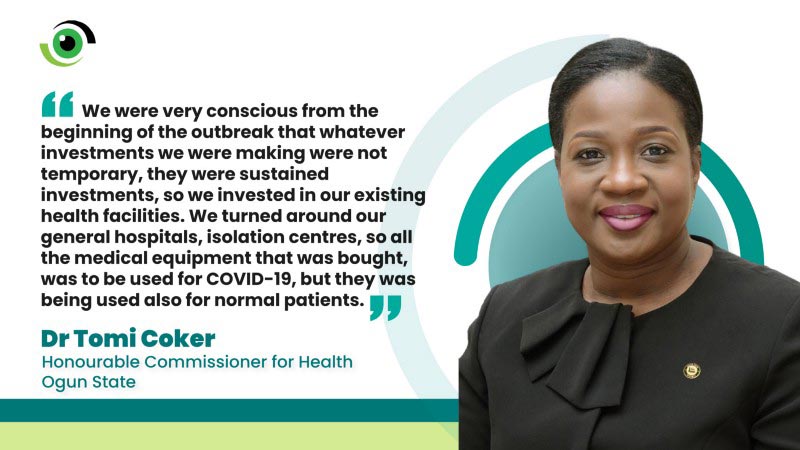
10. Building forward better
Dr Coker is very intentional in ensuring that the Ogun State is able to provide better healthcare for its citizens. Looking back on the last year, a lot of lessons have been learnt as the pandemic saw the country come together in solidarity. Effective measures were put in place in Ogun State to save lives and reduce suffering. Dr Coker mentioned some of the improvements put place in the healthcare system. These included the “renovation of primary health centres, ensuring health financing and universal health coverage through the launching of our health insurance and basic health care provision”. When Dr Coker started her role as the Commissioner for Health in Ogun State, she quickly noted that the provision of emergency services was poor “we need a 24-hour ambulance service, when I arrived it was only available 8 hours, now we have increased our fleet by over 100% and we have a 24-hour ambulance service as a result of this”.
Dr Coker is a clear example is calm and measured leadership. It has been widely reported that although women accounted for 70% of the global health workforce at the frontline of the COVID-19 response, only one in 10 representatives on COVID-19 COVID-19 taskforces were women, and Nigeria was no different. This is despite research showing that countries led by women responded better to the COVID-19 pandemic, when looking at the number of deaths. On some of final lessons learnt, Dr Coker reflected that “it was about keeping a cool head and being strategic”.
As the response to the COVID-19 pandemic continues and we look back on one year of the response, there are some clear wins in Ogun State. Its health budget has been increased and the state policymakers are taking more notice of the importance of the health sector and how precarious our lives are without a strong, functional, resilient health service.
Author
Vivianne Ihekweazu
Managing Director, Nigeria Health Watch.
Website

This article was originally published by Nigeria Health Watch on 27 February 2021.
More from Vivianne Ihekweazu
Recommended for you





